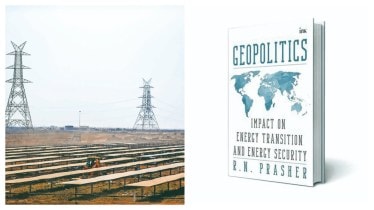By Amitabha Bhattacharya
Geopolitics is a term so widely used, and so vaguely understood, that a clearer definition is called for, especially when its impact on our ‘energy transition and energy security’ is sought to be thoroughly discussed. Energy being a key driver of a nation’s growth and prosperity, capturing its transition problems and contextualising this crucial phase within our broad security interests should attract the attention of thinking individuals and institutional stakeholders. This book, edited by RN Prasher, a civil servant with a deep expertise in the subject, is a collection of essays contributed by a select group of policymakers and key practitioners.
The preface sets the tone of the book. Geopolitics is likened to “a complex global game where nations are like chess pieces and continents are like squares”, characterised by strategy, continuous power dynamics, and extremely high stakes leading to some nations gaining global dominance while others losing it. The editor establishes, with facts and historical analyses, how energy has played a major role in geopolitics among nations. “Nations grew strong through coal extraction and use, then through oil extraction and its processing, and later merely through their control over the trade in energy.
Nuclear power was no exception…” The fear of depletion of natural resources, coupled with global environmental concerns about the planet’s future being in danger, started altering the scene irrevocably. To secure energy security on which national security is substantially dependent, transition to green energy is an imperative now, but the process is very complex. The book shows the ‘why’ and ‘how’ of it. The book comprises four parts and includes 21 essays.
The first part, titled ‘The Policymakers’, consists of four pieces authored by Natin Gadkari, Suresh Prabhakar Prabhu, Raj Kumar Singh, as also by Ghanshyam Prasad who is the chairperson of the Central Electricity Authority. The second part, titled ‘The Concepts’ consists of seven essays written by the editor, RN Prasher (including one co-authored with Radha Krishna Mathur). The third part contains nine essays encompassing the perspectives of ‘The Practitioners’. In the concluding part, ‘The Dream’, Harry Dhaul, the director-general of the Independent Power Producers Association of India, articulates his futuristic concept of India—utopian but interesting nevertheless.
As would be evident from the design and organisation of the book, the purpose is to cover comprehensively the present state of affairs and suggest possible pathways. The readers, therefore, are exposed to a whole spectrum of ideas and experiences—of the anticipated bottlenecks as well as the practical options available to steer the nation through the maze of geopolitics.
Understandably, the essays are of varying quality. The contributions of Nitin Gadkari, Raj Kumar Singh, RN Prasher and Dip Kishore Singh, for example, stand out for their unambiguous articulation of what should be done.
Gadkari’s sustained efforts to reduce carbon footprint in the road and transport sectors are inspirational. Singh, whose work as a minister in charge of power and renewable energy is well recognised, is also clear-headed and explains why, in light of trade barriers imposed by some developed countries and the dumping of cheap steel by others, India “must rapidly adopt technology to decarbonise this sector while maintaining cost competitiveness”.
Prasher argues that ensuring energy security while transitioning to green energy is not a matter of economics alone, and that determination of what is a ‘cheaper source’ in the context of national security is very complex to grapple with. Two of his essays—‘The Promise, Perils, and Pitfalls of Energy Transition’ and ‘Hydrogen’s Role in Energy Security’ deserve special mention. Dip Kishore Sen, while optimistic about the future, flags the daunting challenge of meeting the average annual investment requirement of “USD 160 billion across its energy economy between now and 2030 to be on target for its ultimate net-zero emissions goal by 2070”.
This is not a book for lazy reading by the layman. It is serious work (with an extensive bibliography and notes) that does not shy away from dissecting the complex web of truth, and still ends with some hope, justified with reasons. “Oil-rich nations will no longer enjoy the luxury of being rentier states, as countries like India and China, heavily dependent on energy import, find the dream of energy security more achievable.” The book would be of value to the individuals, and serve as source material for professionals and scholars in the areas of energy and security, as also for many civil service aspirants.
Geopolitics: Impact on Energy Transition and Energy Security
RN Prasher
BluOne Ink
Pp 430, Rs 799
